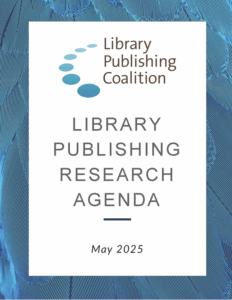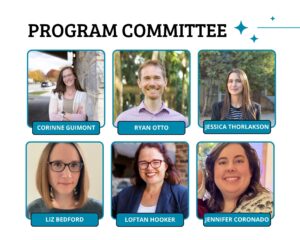July 17, 2025
By Matthew Hunter
 The Library Publishing Coalition (LPC) is thrilled to announce the release of a revised second edition of the Library Publishing Research Agenda. This new edition reflects our continued commitment to supporting a vibrant, inclusive, and evidence-based library publishing ecosystem.
The Library Publishing Coalition (LPC) is thrilled to announce the release of a revised second edition of the Library Publishing Research Agenda. This new edition reflects our continued commitment to supporting a vibrant, inclusive, and evidence-based library publishing ecosystem.
This second edition of the Library Publishing Research Agenda builds on the foundation laid by the original 2020 publication, continuing to explore critical areas where research is needed to inform and strengthen practice in the field of library publishing. It offers updated and expanded exploratory overviews of six key topics: Assessment, Labor, Accessibility, Non-traditional Research Outputs, Peer Review, and Partnerships. The document is divided into sections corresponding to each of these topics, each of which includes a contextual summary, refreshed or newly proposed research questions, and updated resources for further reading. This revised edition reflects new developments in the field and ongoing conversations within the community. It is intended to support current and future researchers, practitioners, and stakeholders committed to advancing knowledge and practice in library publishing. The Research Agenda was developed by LPC’s Research Committee with input from the LPC community.
How to use the Research Agenda
The Research Agenda is offered as a starting point for individuals interested in learning about and conducting research related to library publishing. It aligns with the LPC Research Committee’s mission to promote research that can provide an evidence base to inform best practices for library publishers.
We encourage the members of the library publishing community to use this document in a variety of ways, including purposes aimed at both research and practice. The research questions in each section can be used to develop more expansive research projects that might investigate general trends in library publishing, or as a means of examining current practices and policies within one’s own institution. The listed relevant resources are also intended as a starting point for individuals interested in learning more about aspects of library publishing, even if they are not interested in conducting research in that area.
Where to check it out
The Library Publishing Research Agenda can be accessed in PDF (generously hosted by Purdue University Libraries) and in HTML. As with all LPC publications, the Research Agenda is released under a Creative Commons Attribution (CC BY) license, and we encourage others to share and adapt it as widely as possible. Questions and comments about this document can be emailed to contact@librarypublishing.org.
The creators of the Library Publishing Research Agenda
Talea Anderson, Karen Bjork, Leigh-Ann Butler, Nina Collins, Perry Collins, Matthew Goldberg, Jonathan Grunert, Matt Hunter, Michelle LaLonde, John Martin, Shawn Martin, John Morgenstern, Talia Perry, Christopher Popovich, Liz Scarpelli, Janet Swatscheno, Willa Tavernier, Dan Tracy, Michelle Wilson, and Mai Yamamoto. Production: Maggie Rosenau (copyediting and design). Educopia Institute.
 The Library Publishing Coalition is pleased to announce the release of its
The Library Publishing Coalition is pleased to announce the release of its 



